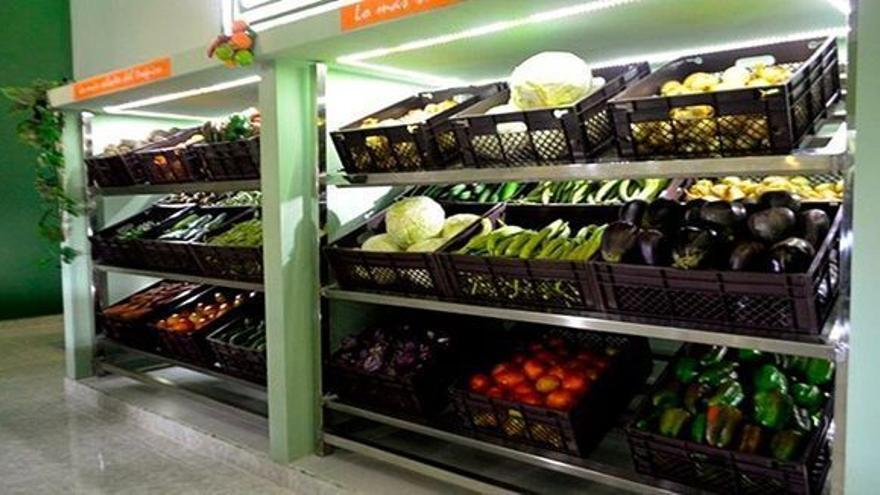
14ymedio, Havana, 10 June 2019 — Ciego de Ávila has just launched a new “merca hostel,” the ninth in the country and first in the province of these wholesale agricultural markets for the self-employed, created by the Government in 2017 to supply the tourism sector.
In Ciego de Ávila there are more than 100 registered homes with lodging and food services. They are the targets of this new type of market type, where they can purchase products, as are the operators of paladares (private restaurants) and cafes. Each will be registered with a customer file that can include two buyers, as explained by the director of the Business Unit of Base (UEB) Selectas Frutas in the City of Portales, Gualberto Torres González.
The manager said that the new establishment has more than 33 products, including bananas, pineapples, garlic, pepper, white cabbage, watermelon, taro, potatoes, oranges, and, more generally, vegetables, grains, and products industrialized or from beekeeping. Other foods that will be offered, depending on the production of the territory, are seasonal and refrigerated, preserved in the province.
Since the private sector was allowed to operate legally, the desire for a wholesale market has been one of the most consistent among the self-employed, along with a reduction in taxes and the ability to import and export without having to go through the State as an intermediary.
In this context, the merca hostales emerged two years ago. The first was in Trinidad, in Sancti Spíritus and, later, the Remedios one in Havana and another in Santiago de Cuba. In the summer five more were added, in Viñales, Baracoa, Cerro, Bayamo and Villa Clara, all of them areas of great tourist activity. Now, number nine arrives.
But the merca hostales are far from meeting the demand and since the beginning they have not been exempt from criticism, since their ultimate goal is to cover the needs of tourism by supplying businesses that pay large taxes and thus support the State, by the creation of State-run network to take over from what was previously handled in the black market.
Some buyers consulted by 14ymedio say that the supply is not stable and that the prices do not offer real advantages for buying in large quantities. “Rather than wholesalers they are wholesale markets where you can buy large volumes but without special offers depending on the quantity because prices are still retail,” laments a self-employed woman who rents two rooms of a colonial house in downtown Trinidad.
The rates in these markets are in convertible pesos and some are not very attractive for the private workers’ pocket. One kilogram of pumpkin costs 0.50 CUC (about 12 CUP), while in the agricultural markets of the Island the product rarely exceeds 5 CUP per half kilogram.
The quality of agricultural products is another of the points that is leading to more complaints. “Fruits, for example, do not meet the standards that one expects to put on the table of a tourist and they almost always sell them green, so they don’t help solve the problem of the next day’s breakfast, we have to wait for them to mature,” explains an entrepreneur. “In addition, not everything is food, in this business I need sheets, detergents, toilet paper. Where is the wholesale market for these supplies?”
In the city of Santa Clara, Yasniel, an cuentapropista who rents three rooms in his house, is a frequent client of another merca hostal managed by the state company Frutas Selectas. “For two years now, I have been buying some agricultural products and also preserving them in this place, and although there is nothing of high quality, at least I can find general products that I would otherwise have to buy little by little in other markets.”
For Yasniel, the best thing about the establishment is that “you can buy at a single time, and legally, foods that you had to buy in several places before,” but “the quality and variety of the merchandise are still not up to par considering the prices we pay.” As an example, he says that “the vegetables most demanded by tourists, such as tomato and lettuce, often are not available, perhaps because they are more difficult to transport and preserve.”
“The same goes for fruits, you can find a lot of fruit and a lot of green fruit, but forget about an custard apples or guanábana, it’s not a market for exclusivities or big varieties, but it’s what you get.” One of the products Yasniel most lacks is “Cuban coffee” that he must continue to buy in stores in convertible pesos at retail prices. “Milk is not found in these markets either, so to prepare a good breakfast I have to keep going to several places,” he laments.
___________________
The 14ymedio team is committed to serious journalism that reflects the reality of deep Cuba. Thank you for joining us on this long road. We invite you to continue supporting us, but this time by becoming a member of 14ymedio. Together we can continue to transform journalism in Cuba.
